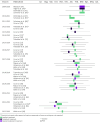Burden of respiratory syncytial virus (RSV) infection in Germany: a systematic review
- PMID: 39164625
- PMCID: PMC11337829
- DOI: 10.1186/s12879-024-09758-3
Burden of respiratory syncytial virus (RSV) infection in Germany: a systematic review
Abstract
Background: Respiratory syncytial virus (RSV) is a major cause of acute lower respiratory infection and hospitalizations among infants, young children, and the elderly. This systematic literature review aimed to summarize the epidemiological and economic burden estimates of RSV infection at any age in Germany.
Methods: We conducted a systematic literature search to identify full-text articles published from 2003 to 2023 and reporting data on the epidemiological or economic burden of RSV in Germany. Based on pre-specified eligibility criteria, data on incidence, rates of hospital and intensive care unit (ICU) admission, clinical manifestation, underlying conditions, seasonality, health care resource use and costs were extracted.
Results: After screening 315 full-text articles, we included 42 articles in the review. The characteristics of the included studies were heterogenous regarding study population, setting, age groups and RSV-related outcome measures. The most frequently reported epidemiological outcome measures were RSV detection rate (n = 33), followed by clinical manifestation (n = 19), seasonality (n = 18), and underlying conditions of RSV infection (n = 13). RSV detection rates were reported across heterogenous study populations, ranging from 5.2 to 55.4% in pediatric inpatient cases and from 2.9 to 14% in adult inpatient cases. All articles that reported RSV detection rates across several age groups demonstrated the highest burden in infants and young children. Few articles reported RSV-related outcome measures distinctively for the outpatient setting. Health care resource use, such as hospital length of stay, ICU admission rate and treatment of patients with RSV infection were described in 23 articles, of which only one study quantified associated costs from 1999 to 2003 for children ≤ 3 years. In-hospital ICU admission rates varied between 3.6 and 45%, depending on population characteristics as age and underlying conditions.
Conclusions: This systematic review revealed that RSV imposes substantial disease burden in infants, young children, and the elderly in Germany, whereby infants are particularly affected. To date, there has been limited exploration of the impact of RSV infection on healthy children or the elderly in Germany. Given their notably high reported burden in studies, the medical and economic RSV burden in these groups should move more into focus.
Keywords: Bronchiolitis; Disease burden; Germany; Resource use and costs; Respiratory infection; Respiratory syncytial virus.
© 2024. The Author(s).
Conflict of interest statement
A. P., M. W. and O. D. are employees of Sanofi-Aventis Deutschland GmbH, and M.B. of Sanofi Vaccines and all may hold shares and/or stock options in the company.
Figures



References
-
- Shi T, McAllister DA, O’Brien KL, Simoes EAF, Madhi SA, Gessner BD, et al. Global, regional, and national disease burden estimates of acute lower respiratory infections due to respiratory syncytial virus in young children in 2015: a systematic review and modelling study. Lancet. 2017;390(10098):946–58. 10.1016/S0140-6736(17)30938-8. 10.1016/S0140-6736(17)30938-8 - DOI - PMC - PubMed
-
- Staadegaard L, Caini S, Wangchuk S, Thapa B, de Almeida WAF, de Carvalho FC, et al. Defining the seasonality of respiratory syncytial virus around the world: National and subnational surveillance data from 12 countries. Influenza Other Respir Viruses. 2021;15(6):732–41. 10.1111/irv.12885. 10.1111/irv.12885 - DOI - PMC - PubMed
-
- Li Y, Wang X, Blau DM, Caballero MT, Feikin DR, Gill CJ, et al. Global, regional, and national disease burden estimates of acute lower respiratory infections due to respiratory syncytial virus in children younger than 5 years in 2019: a systematic analysis. Lancet. 2022;399(10340):2047–64. 10.1016/S0140-6736(22)00478-0. 10.1016/S0140-6736(22)00478-0 - DOI - PMC - PubMed
Publication types
MeSH terms
LinkOut - more resources
Full Text Sources
Medical

